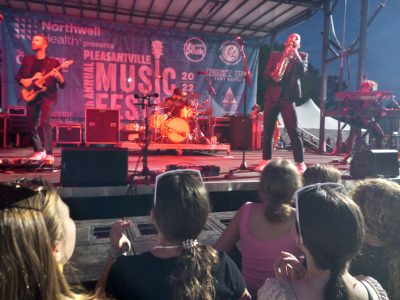Pleasantville Music Fest’s Revenue Losses Pose Questions for the Future
News Based on facts, either observed and verified directly by the reporter, or reported and verified from knowledgeable sources.

Village officials shared last week that a less-than-ideal weather forecast was largely to blame for a deficit in the budget for this year’s Pleasantville Music Festival.
The forecast the day before the July 13 event led to a smaller-than-usual crowd, which meant the village took a financial loss.
“Weather was the driving dynamic for us this year,” said Pleasantville Mayor Peter Scherer. “The question is what does this look like going forward?”
The music festival is Pleasantville’s signature event, which it has hosted annually since 2005 (except for a two-year pandemic-induced hiatus in 2020 and 2021). It has featured an assortment of popular and local bands, sometimes drawing more than 5,000 people to Parkway Field during it its most well-attended years, helping to raise the village’s profile. In some years, there has been surplus revenue, but rainy days and lower ticket sales have resulted in deficits.
The precise size of the shortfall is still unknown, at least until the next Village Board meeting.
“We don’t have the exact numbers but certainly we have a loss on this year’s music festival,” Village Administrator Eric Morrissey told the board at its Sept. 23 meeting.
Morrissey said the village budgeted $357,500 for expenses and expected $310,000 in revenue. Paperwork for additional costs such as village employee and police overtime as well as payments from sponsors are still being received. Once all receipts are processed the monetary loss will be known.
The village just received a $50,000 check from Northwell Health, the festival’s biggest sponsor.
In 2023, the festival lost about $57,000, while in 2022 the deficit totaled $36,000, according to figures released by the village last week. There was also a $15,077 deficit in 2018, while there were surpluses of $47,350 and $40,348 in 2017 and 2019, respectively.
Adding to the pressure has been the need to raise ticket prices, which Scherer called “the number one complaint.”
Tickets purchased in advance for this year’s festival cost $75 for adults (22 to 64 years old) and $55 for students (21 and under) and seniors (65 and up). Admission at the gate increased to $85 for adults and $60 for students. Children under 12 have gained admittance for free if accompanied by an adult who buys a ticket.
Many music fans rely on the weather report in the days leading up to the festival to decide whether they will buy tickets.
“The day of the festival we had 2,200 tickets sold on order, but we needed 1,000 more (than that) sold,” Scherer said of this year’s renewal. “A question to consider is how this could be different or if it needs to be different. It delivers a huge number of benefits and lots of people believe it’s the best day of the year. But it’s a financial risk and hard to pull off.”
Additional factors for the smaller turnout this year were local music festivals such as the one held in Sleepy Hollow in June or the Toonerville Music Festival in Pelham.
“It seems like we are trying to compete with bigger festivals but we can’t really do that,” said village Trustee David Vinjamuri. “We can’t afford the kind of bands that bring more people.”
Suggestions by the board included having two performance stages instead of three, which would reduce the cost but limit the number of bands performing.
“Once we get the real deficit numbers, we really need to discuss options,” village Trustee Paul Alvarez said. “We can’t continue having an event where it relies on the weather.”
Trustee Nicole Asquith noted the festival has broken close to even in some years and has seen a surplus in others.
“If we are getting into a place where consistently the taxpayer is going to be subsidizing this, then that’s a different conversation,” Asquith said. “I personally am uncomfortable with the idea that we’re just going to spend $50,000 to $100,000 on this each year. It doesn’t seem warranted for a one-day event.”
Escalating costs have included higher band performance fees. Also, the business practices of Live Nation have trickled down to smaller festivals by contractually limiting artists’ availability and restricting them from performing in certain venues.
Live Nation is currently being sued by 40 state attorneys general, accused of monopolizing business tactics to take control over nearly all aspects of live events.
The Village Board will be discussing the music festival at its next meeting on Oct. 16. Expected to attend is the festival’s new executive director, Doug Panero, and Bruce Figler, the former director.
Ticket sales for the next year’s festival usually start before the end of the year.

Abby is a local journalist who has reported on breaking news for more than 20 years. She currently covers community issues in The Examiner as a full-time reporter and has written for the paper since its inception in 2007. Read more from Abby’s editor-author bio here. Read Abbys’s archived work here: https://www.theexaminernews.com/author/ab-lub2019/
